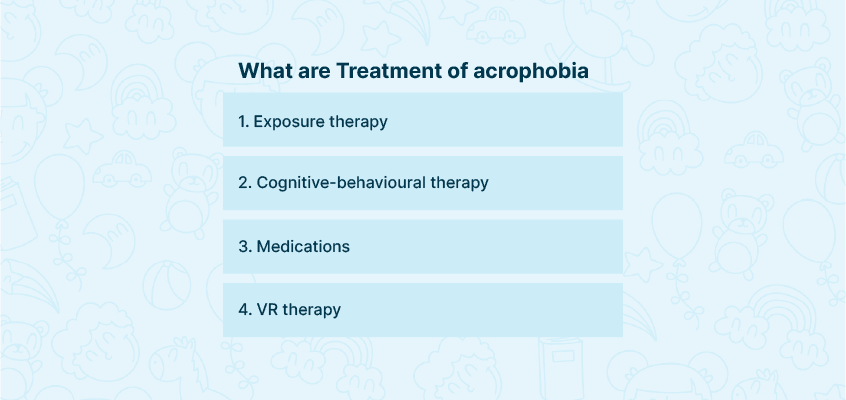No time to read? No Problem. You can go directly and find out an acrophobia experts from here.
Our Wellness Programs
Introduction
Anxiety can lead to irrational fears such as acrophobia or the fear of heights. It is a specific phobia as the fear is related to a particular situation. Just thinking about being at a certain height can make you extremely stressed. Such behaviour could be due to a previous traumatic experience related to heights. With little effort and some assistance, you can help yourself get rid of this phobia and resume your everyday life.
Looking for services related to this subject? Get in touch with these experts today!!
Experts

Kirti Bajpai

India
Psychologist
Experience: 5 years

Neelam Parwani

India
Life Coach
Experience: 5 years

Mansi Chawla

India
Psychologist
Experience: 12 years

Sapna Zarwal

India
Psychologist
Experience: 19 years
What is acrophobia?
Acrophobia is a severe fear of heights leading to panic and anxiety. It could be a learned response as a result of traumatic events. Almost everyone has a fear of some degree at the thought of standing at a great height, especially near the edge or walking on the ledge of a tall building, mountains, etc. But for people who have acrophobia, this fear can be extreme in that it interferes with carrying on everyday activities like work performance, etc. Something as simple as being on a small stepladder or looking out of a window from a floor just above ground level could trigger the fear. Acrophobia can be very exhausting to the sufferer, and it can significantly impact their way of life. It affects up to 5% of the general population. Usually, it starts in children or teens and continues into adulthood. Although acrophobia is not a panic disorder, it can give you the impression that you are.

What are the symptoms of Acrophobia?
If you have acrophobia,
- You may become anxious when you think about heights and be concerned about your safety.
- You avoid heights on purpose.
- You worry about heights a lot.
- You may notice these symptoms for more than six months.
- Physiological changes include increased heart rate, blood pressure, and sweating. The symptoms may vary depending on the severity.
- One may experience shortness of breath, dry mouth, and headaches.
- You may feel nauseous and dizzy whenever you try to imagine heights or see a structure with a great height.
- When you look up at down from a high end or look up high, you may lose your balance.
- If you have tremors, tremble, or shake hands and legs when faced with heights.
What are causes of Acrophobia?
It can happen as a result of a traumatic experience with heights, such as:
- If you have experienced a fall from a height or a fall from a tree, it can cause induce a fear of heights subconsciously.
- When you have watched another people fall from a great height.
- Genetics and environmental factors like a family history of phobias, anxiety disorders, or bad experiences within the family can cause this condition.
- Fear can develop due to repeated negative experiences with heights. Listening to a family member’s, a friend’s, or a stranger’s negative experiences with height can trigger fear.
- While in a high place, you had experienced any negative, anxious situation.
- A parent’s overprotective mechanism can cause acrophobia.
- People afraid of heights estimate a greater vertical distance than those who are not. They perceive the space to be greater than it is and overestimate the height by more than the average person.
How to overcome Acrophobia, 7 useful tips
- Gradually increase your exposure to heights to overcome your fears. Begin with a walk to the bottom of the rock hill and work your way up, higher and better. You could also do this with a multistory building by gradually moving up a level! This method of gradual exposure takes time, but you will eventually be able to reach your peak and be able to do things you never thought you could.
- Justify your fear. Irrational situations usually trigger this fear. An example might be the fear of being on the highest floor of a secure building. Although it is incredibly safe and the chances of something going wrong are nil, it’s easy to become anxious when you’ve developed a fear. Make a conscious effort to consider situations and remind yourself that you do not need to be afraid of the peak because it is highly safe. This reassuring message can help you overcome your fear of heights.
- Make a backup plan to face the worst scenario. Make a list of everything that could go wrong. The list must include a plan for what to do if it does. If you have a plan, you will never be afraid because you will know how to handle any situation. Consider what it would be like to be in a position that makes you afraid. Consider your feelings toward the problem and how you intend to assist yourself. This process can help you prepare by knowing what to expect, which reduces your chances of panicking when the situation arises. Visualisation and planning can help you become more confident when facing heights in real-life situations.
- Lifestyle management includes meditation to reduce anxiety. Relaxation techniques like yoga and deep breathing may cope with anxiety and stress.
- Make new activities a challenge for yourself. It’s a method of confronting fears. You’ll start small and work your way up.
- If you wish to overcome your fears indoors or outdoors, create small goals that you want to achieve and specialise in achieving them one at a time.
- Guided visualisation is a story you create and visualise. The report will take you through the experiences, fears, and emotions you might have associated with a specific thing, like being at an extreme height in a tall building. Feelings exist in your thoughts. Feelings get stronger each time you experience a phobia virtually. The theory is that the more you’re exposed to something that scares you, the less fearful you’ll become. Getting the experience of being in a confined space in the virtual world can help you overcome your fear in a safe environment.
What are the treatment of Acrophobia
- Exposure therapy: The therapist will slowly introduce you to the things you’re afraid of in a safe environment. The idea is to gradually expose your mind and face reality, and you may eventually need to use a stepladder or go out onto a balcony.
- Cognitive-behavioural therapy: This therapy works in combination with exposure therapy. It is to change your perspective on how you view phobias. You work with a therapist to challenge and reframe your negative thoughts about heights.
- Medications: These are an addition to treatment. Although medication cannot help treat phobias, it can help with panic and anxiety symptoms like beta-blockers, benzodiazepines, and sedatives.
- VR therapy: A virtual reality experience can expose you to what you’re afraid o in a virtual world and safe environment. When you use computer software, you have the option to stop right away if things become too much for you.
Conclusion
To summarise, being afraid does not imply that you are in danger. It’s just your body’s attempt to protect you by making you fearful. It is up to you to overcome it consistently and address the underlying cause. If needed, you can seek help from United We Care. It is an online mental health well-being and therapy platform. It offers professional advice on combating emotional and mental challenges.














